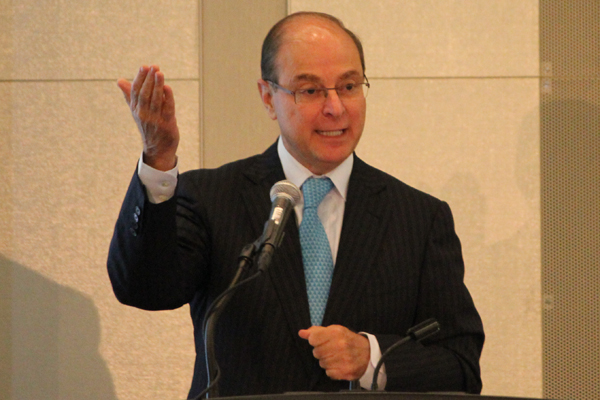President Aoun urges innovation as global demand for higher education grows

Colleges and universities must continue innovating to meet students’ needs in higher education’s evolving global landscape, Northeastern President Joseph E. Aoun told Canadian higher education leaders last month.
Aoun delivered a keynote address to the Association of Universities and Colleges of Canada in Ottawa on June 27. The conference, “Canadian universities in a global context: A dialogue on international trends and opportunities,” welcomed higher education leaders from around Canada to discuss the changes in worldwide higher education.
Aoun’s address, “The Rise of the Rest,” focused on the way colleges and universities have responded to the greatly increased demand for higher education worldwide. He explained that “non-traditional” students—often older, part-time students who have returned to their educations mid-career—are actually the majority of all students, but colleges and universities continue to restrict themselves to serving the small minority of “traditional” students.
Non-traditional students are especially focused on flexible, outcomes-based education, a need that has driven many of the recent changes in higher education. “They want to choose programs with a strong value proposition and very strong outcomes,” he explained. “They ask, ‘Will these programs get me jobs?’” he said, adding that non-traditional learners are particularly eager for experiential learning opportunities—the integration of classroom and real-world learning.
While the new delivery models—Massive Open Online Courses (or MOOCs), adaptive learning, and competency-based education, among others—respond to these expectations, they lack the experiential component that would truly address the mismatch between the skills of recent graduates and the expectations of employers.
President Aoun noted that rapidly developing higher education systems, such as those in China and India, are also grappling with exponential growth combined with a divergence between graduates’ skills and employers’ needs. The traditional, Western model of higher education does not fit these emerging systems so simply transporting the American model may not work. The traditional American system, Aoun explained, is based on limiting access whereas emerging countries need systems that can scale up to meet the demands of much larger populations. There are other limiting factors as well, including the fact that innovations like MOOCs are not feasible in places without connectivity or reliable electricity.
He predicted that we will see more innovations from these rapidly expanding higher education systems in which the key factors are: “low cost, scalability, access instead of exclusion, flexibility, physical nimbleness, outcome orientation, and relevance to the environment they are in.” As emerging economies generate their own distinctive approaches, there is likely to be considerable “reverse innovation,” in which Western higher education systems learn from the those approaches and adopt solutions from the emerging world.
In conclusion, President Aoun explained that this is a moment of tremendous opportunity. “We are in a great situation for higher education,” he said. “There is an enormous demand worldwide. We are not suffering because we don’t have students. The demand is increasing, and it’s up to us to meet this demand or continue to restrict ourselves.”
Aoun has been a leader in addressing critical issues in higher education. He is a member of an academic advisory council that reports directly to Homeland Security Secretary Janet Napolitano, and he’s served as board chair of the American Council on Education. He has also led a coalition of higher education leaders urging the preservation of federal student loan programs.





